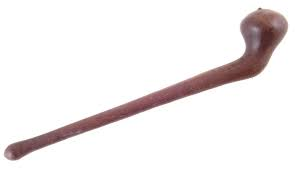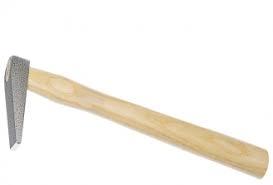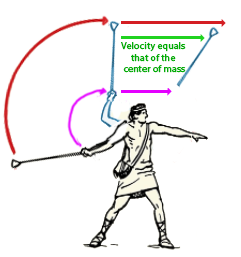Sort of like a Rungu
The closest historical example to this you will probably get are Rungu throwing clubs
... but clubs are not quite hammers. Your idea for a throwing warhammer did not exist historically because it is inherently impractical. This is because any civilization advanced enough to make a throwing war hammer can also make a much more practical throwing axe; so, your setting will need some excuse as to why they need a throwing hammer to begin with. The only historical precedent for such a weapon having a reason to exist anywhere outside of fantasy/mythology/sports is that some historical monastic orders used hammers and clubs because they saw this as an exception to religious oaths that prevented them from spilling blood. So a throwing warhammer could make since for something like a monastic knightly order even if there is no historical evidence of their existence.
An iron age throwing war hammer would look more like a single-ended creasing hammer
Axes and hammers have more or less the same weight distribution and the existence of throwing axes proves that the lack of balance does not stop thrown distal heavy weapons from being viable. In fact, they are more viable than balanced or proximal heavy weapons because they are carried more by the inertia of the weapon's head that follows a larger, and faster moving distal arc than then lighter handle which follows the arc of your hand. Basically they follow the same principle as a sling.
Throwing axes like Francescas and Tomahawks were both very similar weapons despite coming from different cultures. This convergence of properties tells us that there is something about the qualities of a throwing axe that make them more ideal for throwing than their hammerbattle-shapedaxe counter-parts. In general, throwing axes are similar to 1-handed war axesbattle-axes, but they were normally much lighter weighing in at 250-850 grams vs melee war axesbattle-axes which averaged closer to 800-1500 grams. Throwing axes also frequently turn the blade down a bit to make sure it strikes in line with the spiral of the throw.
You can also note that nearly all throwing axes are single-bitted with relatively narrow striking surfaces. This is because the axe will never need to strike with the back or distal end the way you do with a melee weapon because there is pretty much just one right way to throw an axe/hammer, this allows you to make a longer head for your weight making hitting on the handle less likely, and the narrow striking surface is important for getting adequate penetration since you can not drive a thrown weapon through with your bodyweight like you can with a melee weapon.




